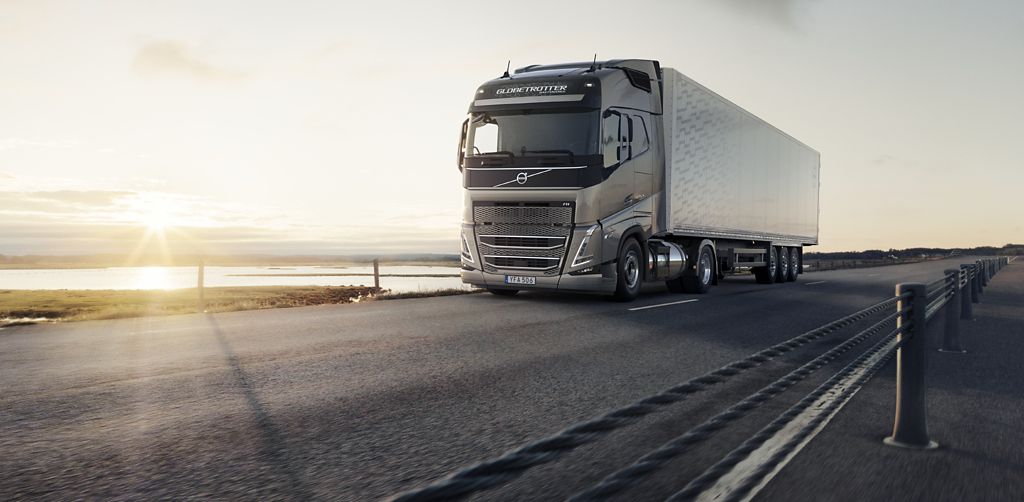Volvo Trucks sees increased interest in gas as an alternative to diesel for heavy-duty truck operations in Europe


The EU Green Deal clearly indicates the direction the transport industry needs to take towards a cleaner future, which means that there must be an end date for fossil fuels. As a result, hauliers and transport buyers are increasingly looking for alternatives to diesel.
“Today, LNG-fuelled trucks are the most commercially viable alternative to ordinary diesel for heavy long-haul operations. This fuel is available in sufficiently large quantities and at a competitive price. Using more gas trucks creates favourable conditions for making a transition to a larger share of liquefied biogas over time,” says Lars Mårtensson, Director of Environment and Innovation at Volvo Trucks.
Volvo Trucks’ driveline for liquefied biogas and natural gas has an energy-efficiency comparable to that of its diesel-powered counterparts, but produces significantly lower CO2 emissions. Using liquefied biogas, also known as Bio-LNG, reduces net emissions by up to 100 percent from tank to wheel (TTW), while using natural gas cuts emissions by around 20 percent (TTW) compared with ordinary European standard diesel.
Reducing diesel dependency requires strong investment
The production of fossil-free biogas requires a greater number of production plants for anaerobic digestion of waste with the possibility of cooling the gas into liquid form. Various studies have calculated that just over 20% of diesel in Europe could be replaced by renewable gas in the form of Bio-LNG by 2030. The number of liquefied gas filling stations is constantly increasing, and is already an alternative to diesel on many routes. However, the number of filling stations needs to continue expanding in pace with a corresponding growth in the number of gas-powered trucks.
“By investing in LNG trucks, we are showing that Bio-LNG is an important alternative to reduce dependency on fossil diesel. However, to speed up the transition to climate-neutral transport, it is necessary to continue investing in liquefied gas filling stations and carrying out measures to make it easier for hauliers to invest heavy in heavy gas-powered vehicles,” Lars Mårtensson points out.
Authorities in several European countries have introduced support initiatives to facilitate the establishment of gas as a fuel for heavy-duty trucks. In Germany, the exemption from paying road tax (MAUT) has been extended until 2023. Sweden and several other countries offer various financial incentives for investment in gas-powered trucks and filling stations.
Need for a mix of fuels going forward
Because no individual energy carrier is capable of meeting all the challenges related to climate change, different types of fuels and drivelines will continue to co-exist for the foreseeable future.
“Embracing new technology will be the key to achieving climate neutrality. The share of LNG trucks will gradually increase in Europe. But gas trucks won’t be able to meet all transport challenges. Electromobility will play an important role locally, as well as regionally going forward, and the development of batteries and charging infrastructure will be important factors in its expansion,” explains Lars Mårtensson.
Electromobility using hydrogen fuel cells has potential to reduce the need for batteries in long-haul transport in the longer term.
“Although promising developments have been made in hydrogen fuel cell technology, there are still practical and financial obstacles to overcome before it can provide significant climate benefits in heavy-duty transport,” says Lars Mårtensson.
Despite all the technical advances in electromobility, ongoing improvement of the efficiency of combustion engines will continue to play a key role in reducing climate impact for many years to come.
“A lot can already be done to reduce climate impact with today’s engines. For instance, both new and older diesel trucks from Volvo can run on HVO, a biofuel producing very low net CO2 emissions. The challenge is that the availability of biofuels continues to be so limited,” Lars Mårtensson concludes.
Link to high resolution images
Link to Volvo Trucks website
Related press releases:
2020-02-27: Volvo Trucks launches new generation of heavy-duty trucks with the driver in focus
2020-02-27: Volvo Trucks launches the new Volvo FH – Next generation of truck designed with the driver in mind
2020-02-27: Volvo Trucks introduces the new Volvo FM – Designed to attract drivers with a new cab and better visibility
2017-09-26: Volvo Trucks: “Liquefied gas is the best available climate alternative on the market for heavy regional and long-haul transport operations”
Jan Strandhede
Media Relations Director, Volvo Trucks
Tel: +46 31 3233715
Email: jan.strandhede@volvo.com
Volvo Trucks supplies complete transport solutions for discerning professional customers with its full range of medium- and heavy-duty trucks. Customer support is provided via a global network of dealers with 2,300 service points in about 130 countries. Volvo trucks are assembled in 12 countries across the globe. In 2022 approximately 145,000 Volvo trucks were delivered worldwide. Volvo Trucks is part of the Volvo Group, one of the world’s leading manufacturers of trucks, buses, construction equipment and marine and industrial engines. The group also provides complete solutions for financing and service. Volvo Trucks’ work is based on the core values of quality, safety and environmental care.